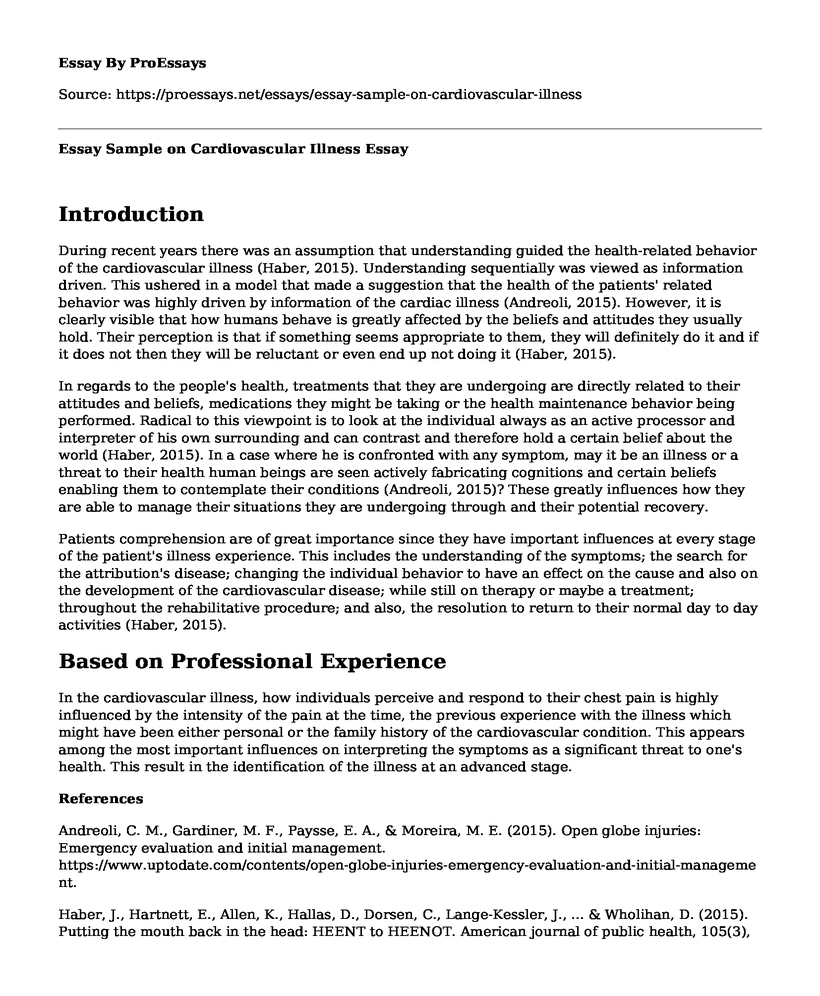Introduction
During recent years there was an assumption that understanding guided the health-related behavior of the cardiovascular illness (Haber, 2015). Understanding sequentially was viewed as information driven. This ushered in a model that made a suggestion that the health of the patients' related behavior was highly driven by information of the cardiac illness (Andreoli, 2015). However, it is clearly visible that how humans behave is greatly affected by the beliefs and attitudes they usually hold. Their perception is that if something seems appropriate to them, they will definitely do it and if it does not then they will be reluctant or even end up not doing it (Haber, 2015).
In regards to the people's health, treatments that they are undergoing are directly related to their attitudes and beliefs, medications they might be taking or the health maintenance behavior being performed. Radical to this viewpoint is to look at the individual always as an active processor and interpreter of his own surrounding and can contrast and therefore hold a certain belief about the world (Haber, 2015). In a case where he is confronted with any symptom, may it be an illness or a threat to their health human beings are seen actively fabricating cognitions and certain beliefs enabling them to contemplate their conditions (Andreoli, 2015)? These greatly influences how they are able to manage their situations they are undergoing through and their potential recovery.
Patients comprehension are of great importance since they have important influences at every stage of the patient's illness experience. This includes the understanding of the symptoms; the search for the attribution's disease; changing the individual behavior to have an effect on the cause and also on the development of the cardiovascular disease; while still on therapy or maybe a treatment; throughout the rehabilitative procedure; and also, the resolution to return to their normal day to day activities (Haber, 2015).
Based on Professional Experience
In the cardiovascular illness, how individuals perceive and respond to their chest pain is highly influenced by the intensity of the pain at the time, the previous experience with the illness which might have been either personal or the family history of the cardiovascular condition. This appears among the most important influences on interpreting the symptoms as a significant threat to one's health. This result in the identification of the illness at an advanced stage.
References
Andreoli, C. M., Gardiner, M. F., Paysse, E. A., & Moreira, M. E. (2015). Open globe injuries: Emergency evaluation and initial management. https://www.uptodate.com/contents/open-globe-injuries-emergency-evaluation-and-initial-management.
Haber, J., Hartnett, E., Allen, K., Hallas, D., Dorsen, C., Lange-Kessler, J., ... & Wholihan, D. (2015). Putting the mouth back in the head: HEENT to HEENOT. American journal of public health, 105(3), 437-441. https://www.ncbi.nlm.nih.gov/pubmed/25602900
Cite this page
Essay Sample on Cardiovascular Illness. (2022, Dec 14). Retrieved from https://proessays.net/essays/essay-sample-on-cardiovascular-illness
If you are the original author of this essay and no longer wish to have it published on the ProEssays website, please click below to request its removal:
- Syndrome Screen in the Era of First-Trimester Screening
- Approach to Care in Cancer Patients - Essay Sample
- Critical Infrastructure and Key Resources (Cikr) Essay
- Intervention Planning for Adolescents and Sedentary Behaviour/Physical Activity in Australia
- Challenges Faced by SEER's National Cancer Surveillance System Paper Example
- Essay Example on Marijuana Use: Debates, Research and Results
- Paper Sample on 25 Years: Neuroscience Advancements & Mental Health Treatment







